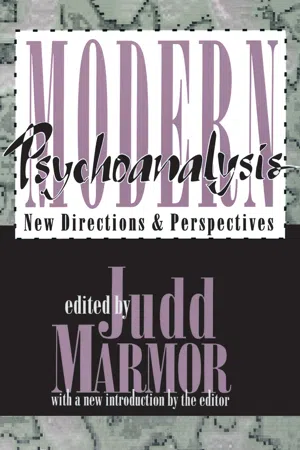Leonard J. Duhl and Robert L. Leopold
Introduction
In recent decades there has been a substantial and growing increase in psychiatric interventions with people who have critical effects on community agencies, institutions, and organizations. These interventions are based on gradually evolving psychiatric concepts that derive from the concern of the modern psychotherapist with the social context of the patient and with the entire social matrix of the community in which patients and nonpatients exist.
Many of the psychiatrists engaged in such interventions are psychoana-lytically trained and experienced. Through their work psychoanalysis has come to have a certain set of implications for community mental health activities. Because they are relatively new and unfamiliar, these implications are pertinent to discussions concerning the current frontiers of psychoanalysis.
This movement away from the dyadic limitations of traditional analytic practice has produced a number of substantial problems. The most pressing of these has to do with the changing identity of the analyst, a matter causing considerable anxiety among psychoanalysts. Zinberg (1965), in a well-reasoned and sensitive review of the relationships between psychoanalysis and various aspects of American life, evaluates the danger to psychoanalysis that lies in a dissemination of its theoretical and therapeutic concepts into the community, that is, the danger of its dilution as a professional discipline. It is clear that a potential danger exists and that this danger is increased if one attempts a point-by-point translation of psychoanalytic concepts valid for individual treatment relationships to community interventions. This is particularly true because interventions in the community must, by their very nature, occur outside the traditional psychiatric milieu. The concepts of social psychiatry make it apparent that one must deal not merely with “cases”; that is, with patients whom one sees outside the office. To do so would constitute only a transfer to another geographic setting of patient-focused psychotherapy. Rather, the newer thinking in social and community psychiatry sees the individual patient and his problems as a “flag” signaling something amiss in the patient’s social system. For example, Stanton and Schwartz (1954) view any unusual disturbance of the individual patient on a psychiatric ward as signaling a breakdown in the physician-nurse care-giving function in relation to the entire ward. Thus “case” treatment, applied alone, violates such thinking. On the other hand, an attempt to apply psychoanalytic thinking to a total situation, without some adaptation, violates the essential spirit of psychoanalytic therapy in the sense that its very base is an extremely personal relationship between therapist and patient.
This chapter presents no such point-by-point translation. Rather, it attempts a more flexible translation whereby psychoanalytic theory in general and certain psychoanalytic concepts in particular are adapted to the uses of social psychiatry. Here psychoanalysis is seen as enlarging and enriching the conceptual framework of social psychiatry, as well as providing additional operational approaches for the social psychiatrist engaged in community mental health activities.
The primary focus of this chapter is not on the ethereal question of whether psychoanalysis has a place in community work. It is a fact that psychoanalytic psychiatrists have been playing, and no doubt will continue to play, critical roles in community work. We believe that the psychoanalytic training and experience of these psychiatrists have been significant factors promoting their effective functioning in these roles. Our purposes here are to examine these factors; to discuss some of the problems connected with the new roles; and to suggest to other psychoanalytic psychiatrists that they may have special values to contribute to community mental health activities, and that participation in these activities may bring them personal and professional enrichment.
Historical Perspective
It is relevant to give some brief initial consideration to the emergence of social psychiatric understanding and attitudes within the discipline of clinical psychiatry itself. At the outset, one must de-emphasize the apparent dichotomy between traditional psychotherapeutic practice and intervention at community levels in the interest of mental health. Everything a patient does and says, including what he does and says as a participant in a social system, falls within the therapist’s purview. Thus every psychiatrist and every psychoanalyst who maintains the fundamental one-to-one relationship of individual treatment must also maintain an indirect relationship to the patient’s social system. Indeed, following the work of Nathan Acker-man in dealing with the family, direct contact with the patient’s total family and other significant figures in his environment has become more common. A modern psychotherapist, then, although he may not practice social psychiatry in the full sense implied here, does, in fact, engage in some aspects of it.
In the twentieth century, new confrontations with social systems have involved psychiatrists in new kinds of relationships with individuals and groups. The experiences of three wars in this century erected the signposts of a new way of working. During these wars, the psychiatrist was asked to lend his special knowled...
